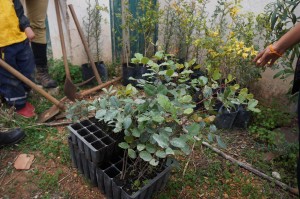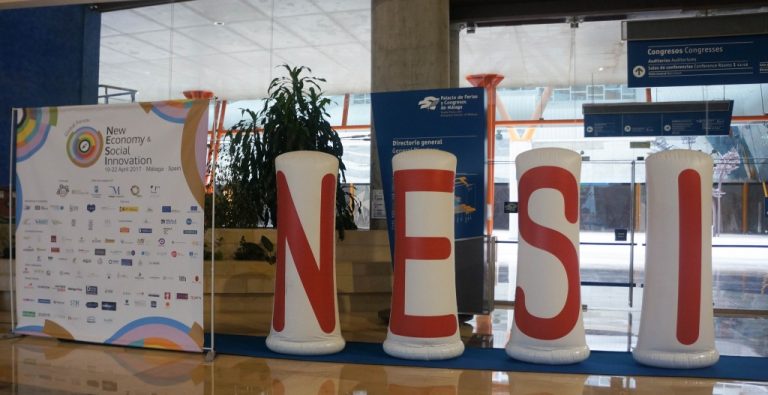Planting trees for resilience – Sunday 26 November 2017
Five years ago a group of enthusiastic people, some dreamers, some with solid plans and hopes came together in a forest near Tavira, to plant trees. Some brought along their skills. Others brought tools and labour. The idea was born out of a small community group of friends who wanted to be part of a global vision under the umbrella of the Transition Movement.
So what is the Transition Movement? The vision is one of inclusion and democracy. Transition’s role is to inspire, encourage, connect, support and train communities as they self-organise around the transition model, creating initiatives that rebuild resilience and reduce CO2 emissions. People get involved from all backgrounds, identities, and countries.
In the Tavira region over the last five years, some individuals have initiated actions and shared information. Others have continued to occasionally water the trees in the Mata, near Tavira. A few structures have been erected in the forest, alongside terraces. Swales or contour ditches were put in place after the March 2013 workshop by Aviram Rozin from Sadhana Forest, Auroville, India. He came to the Mata and shared techniques for growing trees while conserving water. His work in Sadhana Forest, near Auroville, India, began in December 2003 with the aim of transforming 70 acres of severely eroded, arid land on the outskirts of Auroville. The work has been successful.
At Sadhana Forest they have focused on planting only indigenous trees. They have planted:
- 28,000 TDEF (tropical dry evergreen forest) trees in Auroville, India
- More then 80,000 trees in Anse-à-Pitres, Haiti
- And have begun a food forest project in Samburu County, Kenya.
At 10.00 a.m on Sunday 26 November, people will be going to the forest in the Mata to plant more trees and to water existing trees. The trees for planting have been provided by ICF’s nursery in Monte Gordo. Everyone is welcome to come along and help. The encouragement is to bring your own lunch. Some people will be bringing vegan food, but that is not compulsory. Usually, the lunch is shared.
The Global Transition movement has been growing since 2005. The website states:
“It is about communities stepping up to address the big challenges they face by starting local. In practice, they are reclaiming the economy, sparking entrepreneurship, reimagining work, reskilling and weaving webs of connection and support.”
Whether through non-profit actions ethical business, enterprise and the arts, the desire is to raise awareness of processes that will enable local communities to thrive. Principles have been developed over time. These include the development of a healthy group. Indeed, the guidance laid down for starting a group states:
“To deliver Transition effectively, you need to have a well functioning group. If you set up good clear group structures in the beginning, then your group is much more likely to be effective and sustainable. This is not the end though, as your group develops you also need to tend to its needs to keep it healthy and productive, particularly when new people get involved and you develop new projects and work.”
At a minimum, it is great to:
• Have an understanding of how groups develop
• Decided how to make decisions
• Know how to run successful meetings
• Record action points and carry out tasks
• Encourage people to stay in your group
• Understand how to deal with conflict
One good example of how a healthy group operates is what has developed in Totnes, Devon.
Transition Town Totnes (TTT) was created in September 2006 as a company limited by guarantee and it is a registered charity.
This legal structure forms the centre of this vital and dynamic organisation consisting of a range of themed groups, such as food, building and housing, business and the local economy, alongside art and skill sharing.
It is self-organising, mainly volunteer operated, and community-led. Projects are developed by interested members of the community coming together to make them happen, with support for communications, strategic representation and fund-raising from the TTT office.
TTT has 5 Trustees whose experience includes: law, education, health, accountancy, social and community work, and organisational management. The role of Trustees is to ensure financial due diligence and to focus on the objects of the charity.
The Core Group meets monthly and is comprised of a representative from each theme/project group and board of Trustees, as well as TTT support staff. The role of the Core group is:
• To set the strategic direction for the organisation, vote on decisions such as new partnerships and agree on the evolution of the organisation
• To provide the capacity, resources and funding to implement the aims and objectives of the organisation
• To support all participants, including all volunteers and paid staff
• To agree communications to build coherence
The group in Tavira is informal.
The event in the Mata is an opportunity to improve the soil, plant trees while working with other people who want to learn and share skills.
So do come along to the forest outside Tavira and get involved with this small action of planting trees.
For information about the Transition Movement http://www.transitionnetwork.org/about
Sadhana Forest http://sadhanaforest.org
Facebook https://www.facebook.com/tavira.emtransicao/
Co-ordinates for the Mata 37°10’42.5″N 7°36’09.0″W
37.178463, -7.602491
Google Map directions
https://www.google.com/maps/place/37°10’42.5%22N+7°36’09.0%22W/@37.178463,-7.6046797,17z/data=!3m1!4b1!4m5!3m4!1s0x0:0x0!8m2!3d37.178463!4d-7.602491?hl=en
For more information contact Sue@suehall.net

